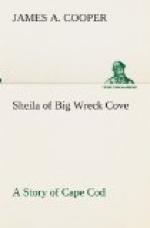He tapped the metal top of the huge knob of his cane and the spring cover flew open. Ira took a pinch of snuff, inhaled it, closed the cover of the box, delicately brushed a few flecks of the pungent powder from his coat lapel and shirt front, and then, burying his nose in a large silk handkerchief, vented a prodigious:
“A-choon!”
Prudence uttered a surprised squeak, like a mouse being stepped on, jerked herself to a half-standing posture, and the potatoes rolled to every point of the compass.
“Goodness gracious gallop!” she ejaculated, quite shaken out of her usual calm. “I should think, Ira, as many times as I’ve told you that scares me most into a conniption, that you’d signal me when you’re going to take snuff. I—I’m all of a shake, I be.”
“I swan! I’m sorry, Prue. I oughter fire a gun, I allow, before speakin’ the ship.”
“Fire a gun!” repeated the old woman, panting as she scrambled for the potatoes. “That’s what I object to, Ira. You want to speak this ship ’fore you shoot that awful noise. I never can get used to it.”
“There, there!” he said, trying to poke the more distant potatoes toward her with his cane. He could not himself stoop; or, if he did, he could only sit erect again after the method of a ratchet wheel. “I won’t do so again, Prudence. I be an onthoughtful critter, if ever there was one.”
Prudence had recovered the last potato. She stopped to pat his ruddy cheek, nor was it much wrinkled, before she returned to peeling the potatoes.
“I know you don’t mean to, Iry,” she crooned. Married couples like the Balls, where the man has been at home only for brief visits between voyages, if they really love each other, never grow weary of the little frills on connubial bliss usually worn shabby by other people before the honeymoon is past. “I know you don’t mean to. But when you sneeze I think it’s the crack o’ doom.”
“I’m sorry about them potatoes,” repeated Cap’n Ira. “I make you a lot of extry work, Prue. Sometimes I feel, fixed as I be in health, I oughter be in the Sailors’ Snug Harbor over to Paulmouth. I do, for a fact.”
“And what would become of me?” cried the old woman, appalled.
“Well,” returned Cap’n Ira, “you couldn’t be no worse off than you be. We’d miss each other a heap, I know.”
“Ira!” cried his wife. “Ira, I’d just die without you now that I’ve got you to myself at last. Those long years you were away so much, and us not being blessed with children—”
Ira Ball made a sudden clucking sound with his tongue. That was a sore topic of conversation, and he always tried to dodge it.
“It did seem sometimes,” pursued Prudence, wiping her eyes with a bit of a handkerchief that she took from her bosom, “as though I wasn’t an honestly married woman. I know that sounds awful”—and she shook her head—“but it was so, you only getting home as you did between voyages. But I was always looking forward to the time when you would be home for good.”




